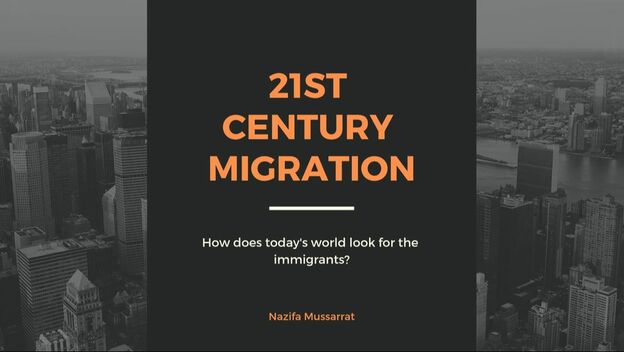ECONOMICS STUDY CENTER, UNIVERSITY OF DHAKA
|
Nazifa Mussarrat Migration. A highly discussed topic of the 21st century. Election campaigns, foreign policy, world summits, you name it, everything has migration or more appropriately “immigration” linked and included as a main topic of discussion. As visible by President Donald Trump’s advent to presidency, we can see how big of a deal immigration can be turned into to successfully attract interest and use it as a leverage to gain attention. Following his footsteps, many European countries, Austria for example have also called for and implemented stronger immigration laws which include cutting benefits for immigrants, stricter screening and selection processes to name a few. But the question is why? Immigration is not a new concept nor has it been unfamiliar to people around the world. The world we live in today and the people we are today would have been very different had there not been migration. The evolution of races, nationalities have all been possible due to migration which started around 2 million years ago with the out of Africa migration of Homo Erectus1. Migration has made it possible for countries like the United States of America to be what they are today as is pointed out by many in reply to the present anti-immigration mentality in that country. Then why the negativity? Why the fear and dislike? Is there really a definite answer to these questions? Had these questions been asked at a GOP rally in USA, or at a Conservative Party Conference in England, there would be a variety of reasons shown by the attendants given their supporting parties’ stances on immigration. Starting from “They are taking our jobs!” to “They breed terrorists”, you can find a range of answers and rationales behind such replies which can vary from logical to unapologetically racist. The rise of parties such as the English Defence League (EDL) who are extremely vocal about their radical beliefs and resentment regarding immigration can be seen as a primary example of rising hostilities towards immigrants. A research by YouGovUK was done in 2016 on authoritarian populism (AP), which included a study on 12 European countries regarding their opinion on immigration and consisted of statements such as “There are so many foreigners living round here, doesn’t feel like home any more”, to which the people had to agree or disagree. In Italy more than half of people (52%) agreed with the statement, making them the nationality most likely to do so. French and German people were also highly likely to agree with this statement, at 47% and 44% respectively. Britons were a close contender with 40% agreeing with this statement. Hence populist political groups such as the EDL have been trying to gain leverage by capitalizing on the increasing anti-immigrant sentiments. The statement “There are so many foreigners living round here, it doesn’t feel like home any more” begs for some more discussion in order to dig in deeper into the dilemma regarding immigration. What do people exactly mean by this? Are they talking about the disregard for integration into the local culture by immigrants, the lack of interest of immigrants to adapt the new culture in order to assimilate better or the practice of immigrants to hold on to their cultures and practice them the same way they used to in their previous countries? While getting a definite answer for this seems to be a major research topic, looking into UK can be a good start. While UK grows more and more diverse, levels of integration do not seem to keep pace with it. In the July of 2015 a report published by Dame Louise Casey called the Casey Review showcased the integration of minorities and segregation in the UK. The report consisted of findings which included the lack of basic rights among women in immigrant communities particularly the Muslim community where women lacked any sort of proficiency in English and were kept inside their homes most of the times and not allowed to integrate. Even though this report was criticized by members of such communities, another study published in Open Democracy showed how towns in UK have grown more diverse but increasingly segregated at the same time. The report came to two conclusions: Firstly, many areas are becoming more diverse with different ethnic minorities moving to the same areas regardless of different backgrounds. Secondly, the white British majority are increasingly isolated from minorities in urban areas. Studies showed that between 2001 and 2011, white British people left the capital London with majority moving to whiter areas and they left London at three times the rate of minorities. All this occurred while the population of London simultaneously rose by approximately one million. This segregation has been linked to prejudice and intolerance of the other cultures due to lack of contact and integration between the social and cultural boundaries. [1] Homo erectus: A species of archaic humans that lived throughout most of the Pleistocene geological epoch All these reports and studies from back in 2016, one of which (the Casey Review) was even commissioned by former UK prime minister David Cameron and the lack of any solutions to the above highlighted problems proves that tackling the fear of the other, which in this case in migrants and immigration is not an easy task. There is no clear-cut solution to these problems that are still on the rise, with the world becoming increasingly more polarized and divided in terms of their race and religion. While all the recent events seem to be history repeating itself, there is still hope, with it being up to the governments to promote tolerance and harmony amongst different communities and reduce the fears and concerns regarding immigration and people of different cultures. References:
1 Comment
|
Send your articles to: |




